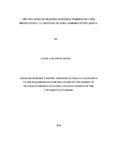| dc.description.abstract | Alliance for a Green Revolution in Africa (AGRA) works to achieve a food secure and prosperous Africa through the promotion of rapid, sustainable agricultural growth based mechanisms on smallholder farmers. In implementation of its vision, AGRA has faced a multitude of challenges in empowering the community. This is because it seeks to empower farmers in diverse locations and with varying cultures. Extension workers at AGRA are therefore constantly equipped with skills to address such a multivariate society. One of the leading challenges for organizations in the current day has been developing and implementing effective training programs to enhance farm productivity, sustainability and development. This study therefore sought to establish the influence of training extension workers on farm productivity. The type of training, mode of training and level of education of extension workers were assessed on how it affects the volume of produce, quality of produce and food security. The purpose of this research study was therefore to determine influence of training of extension workers on farm productivity. The population under study was AGRAs‘ extension workers and the extension support staff, Nairobi County who were 38 in total. This was a descriptive study in nature and it worked to find out the influence of training on farm productivity. A questionnaire was used as the main tool of data collection. The research was essentially qualitative and the researcher administered questionnaires. Interviews were used as well. The quantitative data will be analyzed using SPSS version 18. On the other hand, the qualitative data was organized in an on going process according to the themes, sub-themes, categories and sub-categories and presented in narrative forms. This study found that training of extension workers affects farm productivity. The study further revealed that mode of training of extension workers affects farms productivity to a great extent (81.1%). The mode of training mostly used to train extension workers in training sessions was participation followed by paternalism and persuasion. On the influences of the level of education of extension workers on farms productivity, the study concludes that the level of education affects farms productivity to a great extent. This study therefore recommends that AGRA should increase the frequency of training of the extension workers so as to equip them with information useful to the farmers which can subsequently lead to increase in farm productivity.
x
The study also recommends that extension workers should also seek more information from agricultural extension programs through their websites, that AGRA should recruit qualified extension workers and that further research studies should be carried out, in the area of challenges facing agricultural extension workers in Kenya. | en_US |

